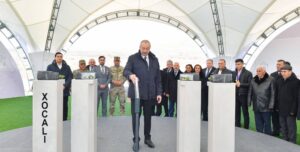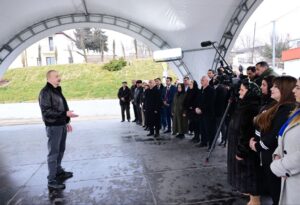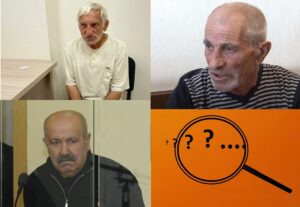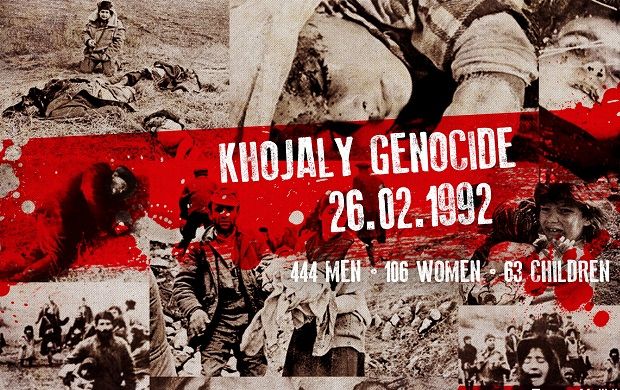On the night of February 25-26, 1992, amid the crumbling remnants of the Soviet Union, the world witnessed a horrific chapter of human brutality in the Khojaly region of what is now Azerbaijan’s Garabagh. Armenian military forces, bolstered by heavy artillery, tanks, and an infantry regiment, surrounded the region in a calculated assault that lasted for two agonizing hours. By the end of this relentless barrage, 613 innocent Azerbaijani civilians were dead, including 116 women, 63 children, and hundreds of others who were left wounded.
This dark and brutal event, often referred to as the Khojaly Genocide, has become emblematic of the wider atrocities committed during the conflict over the region. What unfolded in Khojaly was not simply an act of war; it was a deliberate massacre carried out with chilling precision. The survivors who attempted to flee were met with a harsh and unforgiving environment. As they ventured into the freezing night, they faced not just the elements but also the cruelty of their attackers, who spared no one in their pursuit of terror.
In the aftermath, the horrors of Khojaly did not only end with the deaths of the innocent. Many residents were captured and subjected to torture by the invading Armenian forces. In the years that followed, Armenia refused to acknowledge the fate of the more than 150 Azerbaijanis who went missing, leaving their families to endure the haunting uncertainty of not knowing what had happened to their loved ones. And, disturbingly, those responsible for the atrocities continue to evade justice.
Despite international recognition of the Khojaly tragedy, the Armenian government has consistently denied the facts, deflecting responsibility for this dark chapter in history. The events of that fateful night have been acknowledged as genocide by 17 countries, including Azerbaijan, with 10 nations officially recognizing it as a massacre and seven recognizing it as genocide. Yet, Armenia remains steadfast in its refusal to confront the truth.
For decades, Khojaly remained under Armenian occupation, a constant reminder of the injustice and the unbearable grief that defined the lives of its displaced residents. Every year, as a journalist, I would report on the anniversary of the Khojaly massacre, often speaking to military personnel, survivors, and witnesses who recalled the pain and loss they had experienced. The stories were always heart-wrenching, but they also carried an undercurrent of hope that Khojaly would be free one day.
And that day has arrived. In a monumental shift, Khojaly has been liberated, and for the first time in nearly 30 years, its native people are able to return to their homes. The Azerbaijani government, under President Ilham Aliyev, has spearheaded efforts to rebuild the region, with the construction of residential homes and infrastructure projects symbolizing the dawn of a new era for Khojaly.
It is no coincidence that recently, President Ilham Aliyev and his spouse, First Vice President Mehriban Aliyeva, visited Aghdam, Khankendi, and Khojaly in order to familiarize themselves with the ongoing construction work in the liberated Garabagh. During their visit, they inspected newly built residential buildings. President Aliyev met with the residents of Ballija village in Khojaly and delivered a speech in front of them.
“The restoration of the village of Ballija is also in its final stages,” the President said. “According to my information, 137 houses have already been restored, with about 60 more to be restored,” he added during his meeting with a group of residents who had relocated to the Ballija village in the Khojaly district.
As mentioned by the President, 460 former displaced persons in total have already moved to Ballija. “We have restored the houses, and there are ample opportunities for farming. The land is fertile, and the air is clean. The entire Garabagh region and the East Zangazur region are reviving, and we see this clearly every day,” the President added.
The flowers and roses are blooming once again where bloodshed once stained the land, and the deep wounds of the past are beginning to heal. Khojaly, once synonymous with fear and terror, is now a symbol of resilience and renewal—a testament to the enduring strength of the Azerbaijani people.
No crime goes unpunished
However, the pain of the past cannot be erased so easily. The ghosts of Khojaly remain, as does the question of accountability. Armenia’s continued silence regarding the fate of the missing Azerbaijanis, just like its refusal to provide mine maps, reinforces its unwillingness to face the truth of its actions. But as history has shown, no crime goes unpunished. The mass graves discovered in Kalbajar, Shusha, and other areas of Garabagh serve as grim evidence of the scale of Armenian crimes. These sites stand as silent witnesses to the atrocities committed, and they speak volumes about the brutality inflicted on innocent civilians.
The recent interrogations of Armenian military figures such as Vagif Khachatryan, Rashid Beglaryan, and Madat Babayan have exposed the systematic nature of the crimes orchestrated by Armenian forces. While some of those responsible have been arrested and detained in Baku, many of the true masterminds behind these horrors remain at large. It is clear that those in prison are mere pawns in a much larger criminal network, one that stretches far beyond the borders of the conflict zone.
Khojaly is not an isolated incident; it is part of a broader pattern of atrocities that continue to be uncovered through ongoing investigations. As Azerbaijan’s legal and historical efforts bring these crimes to light, Khojaly remains a stark symbol of the barbarism that unfolded before the world’s eyes. But despite the suffering, the people of Khojaly, and of Azerbaijan as a whole, have shown remarkable resilience. The genocide may have left indelible scars, but it has also ignited a fierce determination to seek justice—both for the victims and for future generations who will never forget their sacrifice.
This is a moment for the international community to step up, to recognize not just the horrors of the past but the urgent need for justice. The crimes committed in Khojaly, and throughout Garabagh, cannot be swept under the rug of history. They must be confronted, acknowledged, and punished. Only then will the victims of Khojaly—and the thousands of others who suffered under similar circumstances—begin to find the justice they so richly deserve.
The journey toward healing is long, but as Khojaly’s story shows, the spirit of its people cannot be crushed. They are returning home, rebuilding, and ensuring that the world remembers the truth. ( Courtesy : Azer News)


